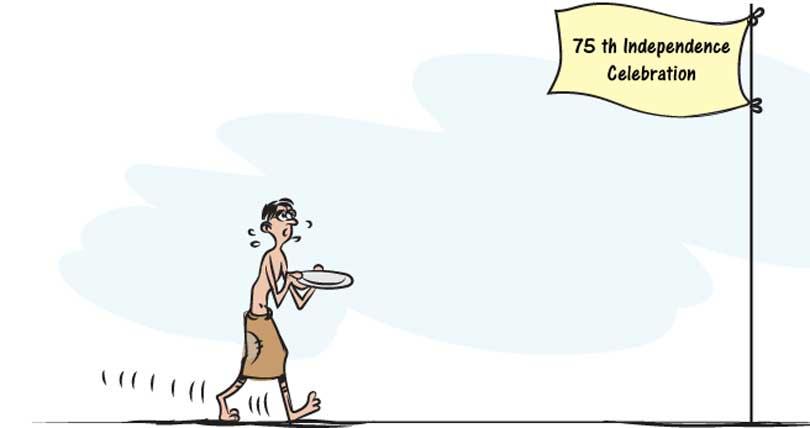31 Jan 2023 - {{hitsCtrl.values.hits}}

Tomorrow, we move into a new month and a special one because on February 4 we celebrate the 75th anniversary of our independence. The government of President Ranil Wickremesinghe and the Sri Lanka Podujana Peramuna (SLPP) are taking practical, but difficult steps to revive the socio-political and economic crisis since independence. The President has officially declared that the country is bankrupt while the cost of living has soared sky high, while millions of people are finding it difficult to have proper shelter, sanitation, education, health and other facilities. Many analysts have tried to interpret the roots of the crisis but it is clear that one of the main causes is bribery and corruption at the highest level, especially among politicians, the failure to take legal action against them and recover the public money they plundered. Thankfully the Supreme Court last week gave a historic verdict when it imposed a personal fine of Rs. 100 million on former President Maithripala Sirisena for his failure to take action to prevent the April 21, 2019 Easter Sunday massacre in which hundreds of people were killed or injured or maimed.
Most independent analysts agree that the current political system is the main cause of the tension and turmoil in the country. When we received independence in 1948, our first Prime Minister was D. S. Senanayake, honourably and justifiably described as the ‘Father of the Nation’. But his term was cut short when he fell from a horse and died on the Galle Face Green. The new Prime Minister was his son Dudley Senanayake, but this created resentment among certain sections especially the ‘Sinhala Only’ group led by S.W.R.D. Bandaranaike. This came after Dudley Senanayake resigned after a hartal over various issues and Sir John Kotelawala took over as Prime Minister for a short period of time.
In the 1956 general election, SWRD Bandaranaike emerged victorious after forming an alliance with the Mahajana Eksath Peramuna led by the ‘Boralugoda Lion’ Philip Gunawardena. But racial tensions emerged with the federal party holding protest marches on the Galle Face Green near what was then the House of Representatives and is now the Presidential Secretariat. There were attacks on the Federal Party leaders led by S.J.V. Chelvanayagam and this led to the declaration of a state of emergency in 1958. The 1960 general election was virtually a dead heat and the Dudley Senanayake-led UNP lost the first vote of confidence. The Sri Lanka Freedom Party (SLFP) also had no influential leader and in a challenging move it turned to SWRD Bandaranaike’s widow Sirimavo Bandaranaike for leadership though she had little or no experience in party politics. Late in 1964, there was a Parliamentary coup with C. P. De Silva and several other SLFP members voting against the budget and the no confidence vote which followed. In the 1965 General Election, Dudley Senanayake led the UNP to a convincing victory and formed a national government with the federal party also joining and one of its frontliners M. Thiruchelvam getting the vital post of Minister of Local Government. There were reports of possible riots but ultimately Dudley Senanayake was defeated on a food issue.
At that time the people were given ration books to buy rice and other essential food items at affordable prices from the nearest cooperative stores. Two measures of rice were given for a week at a subsidised rate. The Prime Minister cut this rice ration to one measure and gave the other measure free. But the people were apparently not happy with that prompting a leading newspaper’s senior editor to say we need to be aware that the stomach is more sensitive than the head.
In the July 1970 general election, Sirimavo Bandaranaike won a virtual landslide in alliance with the Lanka Samasamaja Party and the Communist Party. The government took various radical measures with the then Finance Minister Dr. N. M. Perera telling people to see the benefits that would come to them later from the State takeover of various key projects. But factionalism emerged again, the two Left wing parties quit along with Ministers who supported them.
After Parliament’s term was extended by two years, the UNP’s new leader J. R. Jayawardene led the party to a historic 5/6th majority in Parliament and also introduced the globalised market economic system. The Executive president was able to do whatever he wanted and in the following decades various presidents claimed that they would scrap the Executive presidential system. But they did not because power corrupts and corrupts absolutely. For instance, when Sirimavo Bandaranaike’s daughter Chandrika Bandaranaike Kumaratunga became President in 1994, she pledged she would scrap what she called the ‘Curse of the Executive Presidency’ within 24 hours. But the 24 hours have now become 30 years and we still have this system.
Where do we go from here?
08 Jan 2025 52 minute ago
08 Jan 2025 2 hours ago
08 Jan 2025 3 hours ago
08 Jan 2025 4 hours ago